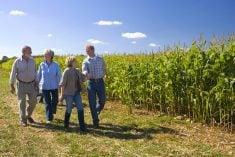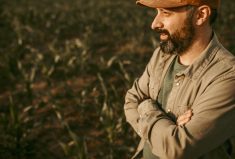Succession is more than passing the farm to the next generation. It’s about setting the farm up for ongoing success through a continual discovery process, examining every aspect of the farm and its operations, pulling out the very best, and incorporating them into best practices. It’s about having conversations with your family that get to the core of the issues. And, using the correct tools to improve the business and to better position your farm for continuity.
That’s why this series is called The Succession Advantage. Engaging with the succession process brings benefits to the entire farm. So be inspired. Succession improves your farm today, and its future too.
Sometimes we see farms and families not pulling the rope in the same direction. They always seem to get the farming stuff right: the crops, the livestock, those never miss a beat. But there’s something about communication or family relationships they can’t seem to get right. Sound familiar?
Read Also

Riding the tariff rollercoaster
Farmers are accustomed to roller-coaster years. But the current geopolitical windstorm is something else entirely. On his cattle operation near…
“Now we are all very much aware of the importance of listening to each other and valuing one another’s input,” Shane Mowat said after a facilitated family meeting. Owner of JockValley Farms, a mixed farm in Ontario, Shane and his wife Donna have four children: Brittany, Bailey and Bethany, and Bobby. All four of the children would like to be involved in the farming operation, which means respectful communication has to be at the core of transition discussions. “I came to realize there are five other opinions and they all have merit,” Shane says. “They all require listening and acknowledgement.”
This is a family that is taking advantage of their strengths — what we refer to as “leveraging their unique abilities to their full potential.” They have a process for the business. Roles are clearly defined and they follow a plan — very little is up in the air.
This didn’t come easily; it came with work. But the result? This family is at their peak performance, maximizing efficiencies and leveraging their unique abilities.
Bobby, the youngest son, says having regular family meetings to discuss the farm business has significantly shaped the vision for JockValley. “Each of us has different expectations as to how this thing should go to get to the same end goal,” he says. “We had to have continuous meetings to sit down and talk and put it all out on the table. We needed to know where everyone stood, and we needed to make sure that we could all work together and still have our family dinners every Sunday.”
It’s important to pause and take a moment to reflect here. Every farmer can relate to this. Communication is tough. With family, it’s even harder. And when it’s about something as personal as your family farm, it can feel like an insurmountable challenge to even begin the conversation. Yet, hands down, it’s the most critical piece to have in place for the succession journey.
What happens if you get the communication part right? All sorts of good things.
Healthy family communication gives you an incredible advantage. Once the barriers are identified, these factors become massive points of leverage. One of the tools that helps identify these barriers is a behavioural assessment. (In our process, family members complete this process during our discovery phase of the succession journey.)
The assessment works by asking a series of questions designed to better understand how each person best delivers and receives information. The result? Your family gains a unique understanding of each member’s individual communication style, internal motivation, abilities and more.
This in turn creates a key advantage. The tool helps the family to understand and better evaluate each other’s strengths and weaknesses, and how their unique personalities can be leveraged and applied to the farm operations.
This also forms the basis for further communication tools to be co-created with the family.
It’s also important to develop what we call a family communication charter to allow for meaningful business planning meetings. This is a framework that families commit to that can include items like:
• Will business planning meetings take place on or off the farm? Where is the best environment to make farm decisions?
• Whose ears need to be at the table when talking about farm debt?
• Does everyone who is sitting at this table have a voice and a vote?
You also need boundaries around when business discussions can happen (i.e. not during Sunday family dinners).
Together, behavioural assessments and communication policies allow the family to better understand how to interact, communicate and leverage their unique abilities to set the farm up for future success. These three characteristics are commonly the result:
1. Family values are clearly defined.
2. An open forum is established with defined rules for discussion and making decisions.
3. Differences are understood and embraced. This enables individual strengths to make a greater economic impact for the farm.
For the Mowat family, it has shaped how they communicate both in the business and overall as a family.
“We’re all very much aware of the importance of listening to each other,” Shane says. “We thought we were before, but now are more in tune with it and really valuing each other’s input.”















